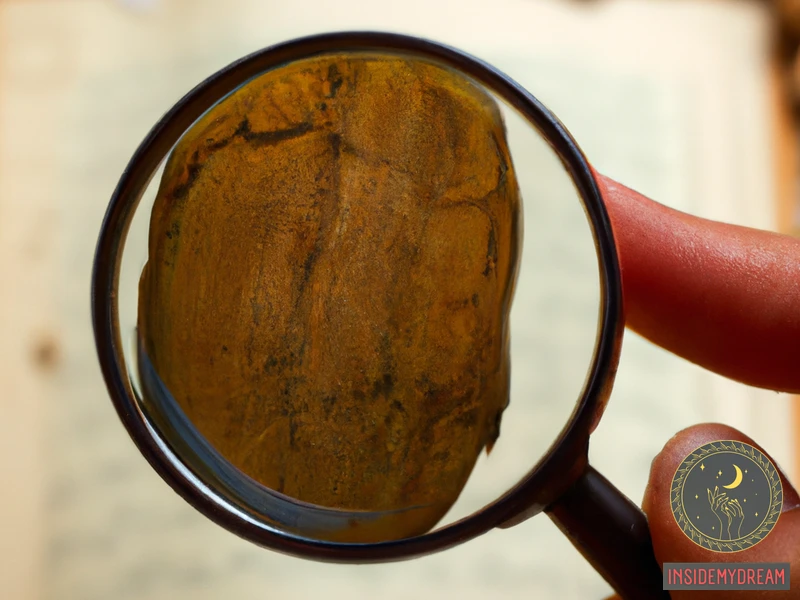The spiritual meaning of smelling sandalwood has been known for thousands of years and is still widely used in religious ceremonies, meditation, and spiritual practice today. Sandalwood has a deep, woody, and earthy aroma that can help to provide a calming and grounding effect. It is believed to help to open the third eye chakra and can be used to create a sense of inner peace, balance, and spiritual connection. In this article, we will explore the power and benefits of sandalwood and how it can help to unlock the spiritual meaning of smelling sandalwood.
History & Origin of Sandalwood

Sandalwood has been used for centuries in spiritual rituals, ceremonies and aromatherapy. Its spiritual significance is strongly connected to its scent and its history. Here are some amazing facts about the history and origin of sandalwood:
- Sandalwood belongs to the Santalaceae family and is native to India, Indonesia and Pacific Islands.
- The wood is highly valued in India and has been used as a religious offering for thousands of years.
- Sandalwood oil is distilled from the heartwood and roots of the sandalwood tree.
- In India, sandalwood is used for religious ceremonies, to make incense and perfumes, and to make sacred items like statues.
- Sandalwood has been used in ayurvedic medicine for centuries.
- The wood is also used in traditional Chinese medicine to treat a variety of ailments.
- Sandalwood is known for its calming and soothing properties and its ability to promote feelings of peace and relaxation.
Sandalwood has a long and rich history and its spiritual significance is still strong today. Its calming and soothing properties make it perfect for spiritual ceremonies and aromatherapy. Its unique scent is sure to bring about a sense of peace and relaxation.
The Spiritual Meaning of Sandalwood
Sandalwood has been a part of many spiritual practices and rituals for centuries. Its scent is believed to have a calming and soothing effect, and it is often used in meditation and prayer. The spiritual meaning of sandalwood is closely connected to its calming and soothing properties.
Subscribe and Get a Free Dream Journal from Us
Sandalwood in Ancient India
Sandalwood has been used in Indian spiritual practices for thousands of years. The Vedic scriptures mention sandalwood as one of the five sacred trees. It was believed to have a special connection to the divine, and was often used in religious ceremonies and offerings. It was also believed to promote longevity and health.
Sandalwood in Religious Practices
In many religions, sandalwood has a spiritual significance. It is often used in Hindu and Buddhist temples, as well as in Islamic mosques. It is believed to help create an atmosphere of peace and serenity, and can be used to aid in meditation and contemplation. Sandalwood is also a symbol of purity and is often used in purification ceremonies.
The spiritual meaning of sandalwood is closely connected to its calming and soothing properties. Its scent is believed to have a calming effect and can help to bring a sense of peace and tranquility to any space. It is also believed to aid in mental clarity and bring spiritual insight. For these reasons, sandalwood has been used in spiritual practices for centuries, and its spiritual meaning is still highly revered today.
Uses of Sandalwood

Traditional Uses
Sandalwood is one of the most revered of all fragrances in India, highly valued for its spiritual and medicinal properties. It has been used for centuries in religious ceremonies, to purify and cleanse the environment, and as an aid to meditation. Sandalwood is also used in traditional Ayurvedic medicine to treat a range of ailments including skin disorders, urinary tract infections, and digestive issues.
Modern Uses
In recent years, sandalwood has been increasingly used in aromatherapy and as a natural fragrance in cosmetics and perfumes. It is known to have calming and soothing effects on the mind, aiding relaxation and reducing stress. Sandalwood oil is also known to be a natural insect repellent and can be used in therapeutic massage to reduce inflammation and promote relaxation.
Benefits of Smelling Sandalwood
Physical Benefits
Balanced Hormones: Sandalwood has been known to act as an anti-inflammatory which can reduce stress and balance hormones in the body. It can also help reduce the symptoms of PMS, such as cramps and bloating.
Pain Relief: Sandalwood can be used as an analgesic to relieve pain, headaches, and muscle aches. Sandalwood oil can be used topically to treat joint pain, headaches, and other minor aches and pains.
Respiratory Health: Sandalwood has expectorant properties which can help to loosen phlegm and clear up congestion. It can also help to reduce inflammation in the lungs, which can help with asthma and other respiratory conditions.
Mental Benefits
Reduced Stress: Sandalwood has a calming effect on the mind, which can help to reduce stress and anxiety. It can also help to clear the mind, allowing for greater concentration and focus.
Improved Memory: Sandalwood has been known to improve memory and focus. It can help to sharpen the mind and increase the ability to recall information.
Spiritual Awakening: Sandalwood has been used for centuries in spiritual ceremonies and rituals. It can help to open up the third eye and increase spiritual awareness.
Scientific Research on Sandalwood

- Aromatherapy – Inhaling the scent of sandalwood essential oil has been found to have a calming effect and may help reduce stress and anxiety. It has also been found to have a sedative effect and may help improve sleep.
- Antioxidant Properties – Sandalwood essential oil has shown to have antioxidant activity and may help reduce oxidative damage to cells and protect against certain diseases.
- Skin Care – Sandalwood essential oil has been used topically to treat skin conditions such as acne, eczema, and psoriasis. It has also been found to have anti-inflammatory and antiseptic properties.
- Antimicrobial Properties – Sandalwood essential oil has been shown to have antimicrobial activity and may help prevent the growth of bacteria and fungi.
- Cancer Prevention – Studies have found that sandalwood essential oil may have anti-cancer properties and may help protect against certain types of cancer.
Safety & Precautions
- Avoid using sandalwood oil if you are pregnant or breastfeeding. It is better to avoid it as it can cause side effects such as nausea, vomiting, dizziness, and headaches.
- Do not apply the oil directly to your skin. It is better to dilute it with a carrier oil before applying it to your skin. This will help avoid any skin irritations or reactions.
- Do a patch test before using the oil. Apply a small amount of the diluted oil to a small area of your skin and wait for 24 hours. If you have any skin reactions, such as redness, itching, or burning, discontinue using it.
- Do not ingest sandalwood oil. It is not safe to ingest essential oils and can cause serious health problems. If you are looking for internal benefits, try using a tea or tincture.
- Keep the oil away from children and pets. Essential oils can be toxic if ingested, so it is important to keep them out of reach of children and pets.
- Do not use sandalwood oil if you have sensitive skin. It can irritate the skin, so if you have sensitive skin it is best to avoid using it.
- Avoid exposing the oil to sunlight. Sunlight can degrade the oil and make it less effective.
How to Use Sandalwood
- Aromatherapy – Sandalwood essential oil can be used in aromatherapy to help promote relaxation and reduce stress. Simply add a few drops to an essential oil diffuser or use it in a massage oil.
- Skin Care – Sandalwood has been used in traditional skin care as an anti-inflammatory and to help reduce acne. Sandalwood essential oil can be added to a carrier oil and applied directly to the skin.
- Incense – Sandalwood has been used for centuries in incense for its fragrant aroma. Simply light a stick of incense and allow the pleasant scent of sandalwood to fill the air.
- Tea – Sandalwood can be used to make a tea that is believed to have calming and soothing effects. Simply add a few pieces of sandalwood to boiling water and let steep for 10 minutes.
- Meditation – Sandalwood can be used to help promote a sense of relaxation during meditation. Burn some incense or use sandalwood essential oil in an aromatherapy diffuser.
Frequently Asked Questions
What Are the Spiritual Benefits of Smelling Sandalwood?
Sandalwood has long been used in spiritual and religious practices due to its calming and invigorating effects. Smelling sandalwood can help clear your mind and create a sense of peace and tranquility. Additionally, it can increase your concentration and enhance your meditation practice. Sandalwood is also believed to help purify the body, mind, and spirit and allow for deeper spiritual and emotional connections. Its uplifting and comforting scent can help to open the heart and elevate your sense of wellbeing.
How Does Sandalwood Help to Connect with the Spiritual World?
Sandalwood has been used for centuries in spiritual ceremonies for its calming and uplifting properties. It is believed to open a person’s crown chakra, the gateway to the spiritual realm, allowing for easier access to higher realms. Burning sandalwood incense or anointing oneself with sandalwood oil can create a spiritual atmosphere conducive to meditation and prayer, helping to open the mind and heart to spiritual realms. Additionally, the musky scent of sandalwood has been used to help ground and center oneself, allowing for a deeper connection with one’s inner self and the spiritual realm.
Is there any scientific evidence to support the effects of sandalwood on spiritual wellbeing?
- Sandalwood has been used for centuries in religious ceremonies and rituals for its calming, spiritual effects.
- It has been used in Ayurvedic medicine for its purported ability to reduce stress and anxiety.
- Studies have shown that sandalwood has sedative effects, which suggests it may help to reduce stress and anxiety, and improve overall wellbeing.
- In one study, participants who inhaled sandalwood aromatherapy experienced a reduction in stress and anxiety levels.
- Research has also found that sandalwood has anti-depressant, anti-inflammatory, and antioxidant properties.
- The aroma of sandalwood has been found to reduce heart rate and blood pressure, which can have a calming and relaxing effect.
- Inhaling sandalwood may also help to improve mental clarity and focus, and reduce fatigue, due to its sedative effects.
Overall, the evidence suggests that sandalwood can have a positive effect on spiritual wellbeing by reducing stress, anxiety, and fatigue, and improving mental clarity and focus.
How should I use sandalwood to get the most benefit?
- Aromatherapy: Sandalwood essential oil is a popular choice for aromatherapy. It can be used as an inhalant to help soothe the mind and body, reduce stress and improve mood.
- Massage: Sandalwood essential oil is often used as a massage oil to help relax muscles and ease tension.
- Skincare: Sandalwood essential oil can be used to help treat skin conditions such as acne, eczema, and psoriasis.
- Relaxation: Burning sandalwood incense or using a diffuser with sandalwood essential oil can help create a calming environment and promote relaxation.
- Spiritual Practices: Sandalwood has long been used in spiritual practices for its calming and grounding properties. It can be used in meditation and prayer to help focus the mind and open the heart to higher spiritual realms.
Are there any potential side effects of using sandalwood for spiritual purposes?
Skin Irritation: Sandalwood oil can cause skin irritation and allergic reactions when applied directly to the skin. It is important to test the oil on a small area of skin before using it extensively.
Interaction with Medications: Sandalwood oil may interfere with the efficacy of certain medications, so it is important to consult a doctor before using it while on medication.
Nausea: Sandalwood oil has been known to cause nausea and vomiting when ingested in large doses. It is important to not ingest sandalwood oil in large amounts.
Drowsiness: Sandalwood oil may cause drowsiness and sedation when inhaled or applied to the skin, so it is important to be aware of this when using it for spiritual purposes.
Headache: Sandalwood oil may cause headaches when inhaled, so it is important to be aware of this and take proper precautions when using it for spiritual purposes.
Conclusion
Sandalwood has a unique scent that can have a profound effect on both the body and mind. It has been used for centuries in Ayurvedic and Chinese medicine to promote relaxation and spiritual awareness. Sandalwood also has powerful antibacterial and anti-inflammatory properties, making it beneficial for skin care and other health benefits. Burning sandalwood incense, diffusing its essential oil or simply enjoying the scent can help to open the senses, clear the mind and enrich the spirit.










